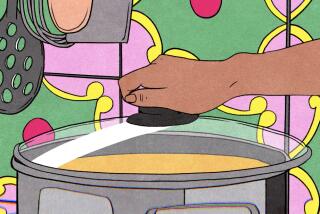Putting ‘Big World’ of Poetry in Motion : Dennis Lee Askew of Costa Mesa travels to promote the art form and a literary tradition as well as his work.
- Share via
Costa Mesa writer Dennis Lee Askew spent a year and a half writing the 40 short poems in his poetry book “The Big World of Love.” But as all self-published writers know, that’s only half the battle. And with no publishing house supporting him, he had to get out there and hustle the book on his own.
That’s just what he did, piling 100 copies in the back seat of his car and heading north on a 10-day bookselling trip.
And, Askew says, every bookstore he stopped in--from Santa Barbara to Salinas to Berkeley--took copies of both his book and the colorful promotional poster, which he describes as looking like “Jimi Hendrix went to the Museum of Modern Art.”
“I didn’t have any trouble with anybody,” Askew says. “I walked in just like Willy Loman with a shoeshine and a smile.”
“The Big World of Love” ($5.99) is a long, thin volume with poems divided into three categories: romantic love, friend and family love and “Supreme” love. As Askew says, “People can relate to it one way or the other.”
Askew, 40, who once worked as a rock and roll writer for the Las Vegas Sun, spent the past eight years working in brokerage houses and banks in stock and bond administration. He quit to pursue writing.
“Everybody will probably think I’m having a midlife crisis, but I’ve written other books and a stage play,” he says. “Everybody keeps telling me, ‘Drop the poetry, get it out of your system and write a (potentially more lucrative) screenplay.’ ”
Askew isn’t interested in screenwriting, however, and is actually thinking of writing a second volume of poetry.
Of his bookselling foray north, he says: “I was just out going to bookstores and going in and talking to the buyers, seeing how bookstores are doing in the recession and just more or less trying to put an edge on poetry.
“Poetry always seems like it’s in the back of the bookstore, and poetry books seem to be small, dark-colored books that people just pass by.”
Not his book. “My book has a real bright (blue) cover and the intention of that was, ‘Hey, folks, look over here!’ and that all things don’t have to be all dark and cerebral when it’s poetry. They can be lighthearted and can compete for people’s television time and time doing other things.”
Back home in Costa Mesa, Askew dropped by Tower Records, “which carries a pretty good book selection. They took a stack of books and a couple of posters and put them in the book section--near a U2 display they had up at the time.
“That’s where poetry should be--out in the front of things, not always in the back of the store. Because good things get said through poetry. Even when you hear rap music. That’s just a different podium for poetry, for people to stand up and say what they feel.”
There are, he says, “lots of poets that write very contemporary material which is as good as the past masters, and that sort of stuff deserves to be brought out and have the same recognition as good bands and good painters and people like that.”
Askew says many of the booksellers and store owners he met on his trip north “were shocked to see a poet out on the road.” But, he says, “They were real open to it.
“They said they mainly order stuff out of catalogues and publicity material--that they never get to see the writers (selling their own work). It’s like a lost art or old tradition.”
In fact, Askew says, he found a copy of a 1794 caricature of an author trying to sell his book to a bookseller “and to thank everybody for being so nice to me on the road I sent them all a note and said this is a time-honored tradition.”
More to Read
Sign up for our Book Club newsletter
Get the latest news, events and more from the Los Angeles Times Book Club, and help us get L.A. reading and talking.
You may occasionally receive promotional content from the Los Angeles Times.









